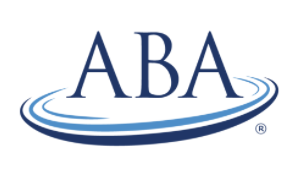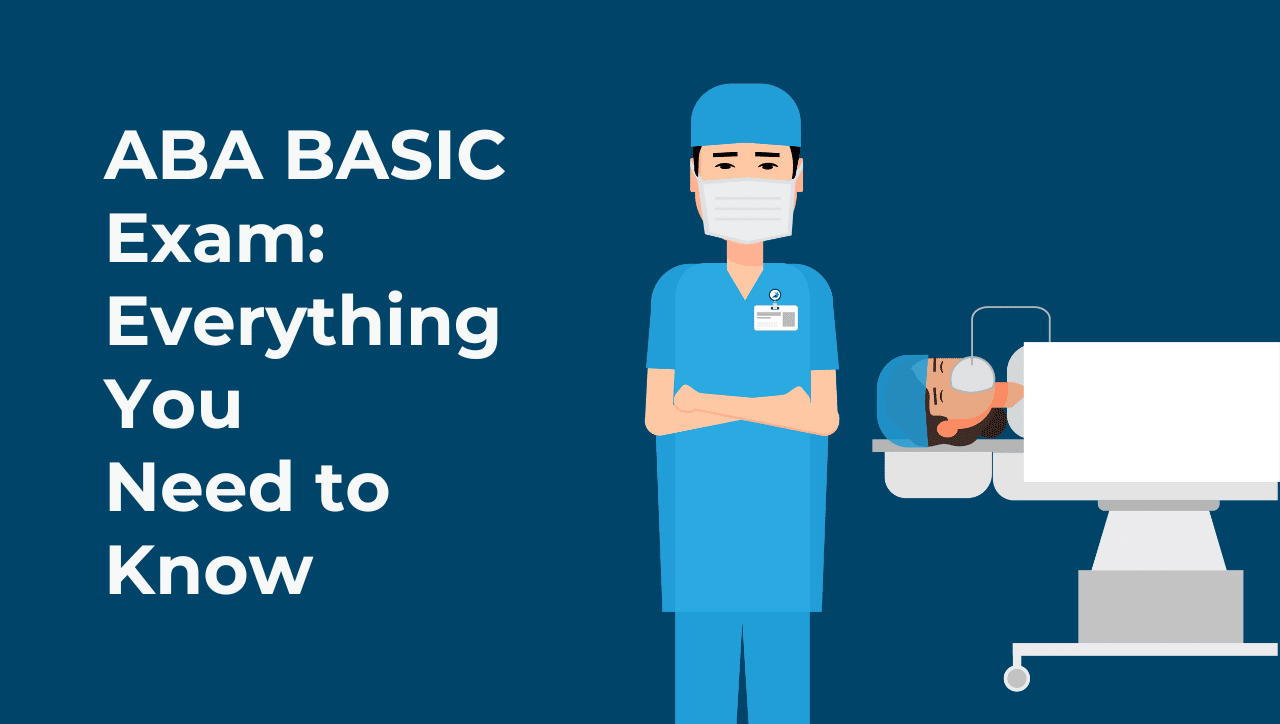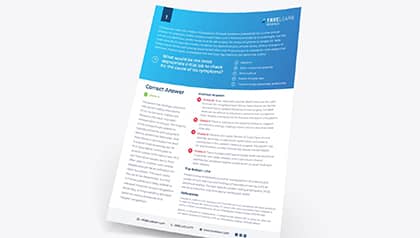ABA ADVANCED Exam: Everything You Need to Know

The ABA ADVANCED is an important certification exam for anesthesia professionals to further advance their careers. It is the second of a staged exam series, preceded by the BASIC and followed by the APPLIED exam. This exam is administered by the American Board of Anesthesiology (ABA) twice per year to physicians who have completed an ACGME-accredited anesthesiology residency program.
ABA ADVANCED Exam Format
The ABA ADVANCED exam is a 4-hour, computer-based exam that is designed to test the knowledge and skills of practicing anesthesiologists. It tests the candidate’s ability to think critically, analyze data, and apply their knowledge and skills to solve clinical problems.
The questions on the ABA ADVANCED exam are A-type items, which are single-best answer presented in a multiple-choice format. The exam covers a wide range of both basic and advanced topics, divided into 5 categories.
- Basic Sciences (9%)
- Clinical Sciences (10%)
- Organ-based Basic & Clinical Sciences (30.5%)
- Clinical Subspecialties (44.5%)
- Special Problems or Issues in Anesthesiology (6%)
How Many Questions are on the ABA ADVANCED?
The ABA ADVANCED exam consists of 200 multiple-choice questions. Some may reference images or short video clips and all of the questions are designed to test applied knowledge.
When to Start Studying
The amount of time needed to study for the ABA ADVANCED exam varies from candidate to candidate. However, most candidates will need to study for at least six months to a year to adequately prepare for the exam. Candidates are advised to use a variety of study materials, including textbooks, review courses, and ABA ADVANCED question banks, to ensure that they are fully prepared for the exam.
How Many Times Can Candidates Take the Exam
Candidates are not limited in how many times they can take the ABA ADVANCED. However, anyone who fails the exam on their first attempt is encouraged to seek feedback from the ABA and to thoroughly prepare for subsequent attempts.
Note: You must satisfy all requirements for certification within 7 years of completing your residency, which involves studying, taking, and passing the BASIC, ADVANCED, and APPLIED exams. That time will go quickly without proper planning and preparation.
ABA ADVANCED Pass Rate
In 2021, the ABA ADVANCED pass rate for first-time and repeat test takers was 85%.
In the event of a failing score, TrueLearn subscribers who purchased an ABA ADVANCED SmartBank for 90 days or more are able to redeem their Pass Guarantee, which is a complimentary subscription of equal length to the original subscription.
Top 3 Things You Need to Know If You’re Taking The ABA ADVANCED
- Register early: The ABA opens registration a few months ahead of the exam. It’s best to plan ahead and sign up early because the exam fees increase during late registration.
- Focus on clinical problem-solving: The ABA ADVANCED exam is designed to test the candidate’s ability to apply their knowledge and skills to solve clinical problems. Candidates should focus on developing their problem-solving skills by practicing with clinical scenarios.
- It’s not the end if you fail: Failing the ABA ADVANCED is not ideal, but it is also not the end. Candidates can seek feedback from the ABA on performance and use that information to identify areas of weakness, which is invaluable for the next attempt.
7 Tips for Helpful Exam Preparation
Preparing for the ABA ADVANCED exam requires a lot of studying and preparation, given the broad range of topics and subspecialty areas covered by the exam. Here are some study tips that may be helpful for exam preparation:
- Develop a study plan: Create a detailed study plan that outlines your daily, weekly, and monthly study goals, and make sure to allocate enough time for each subspecialty area. This will help you stay organized and focused in your studies.
- Use reliable study materials: Choose reliable study materials, such as textbooks, review books, and online resources, that cover the topics and subspecialty areas tested on the ABA ADVANCED exam.
- Take practice exams: Take advantage of practice exams to gauge your progress and identify areas that need more attention.
- Join study groups: Joining study groups or discussion forums can be a helpful way to exchange information and ideas with other exam candidates.
- Attend review courses: Consider attending review courses offered by professional organizations, which can provide a comprehensive review of the subspecialty areas tested on the exam.
- Stay focused and motivated: Studying for the ABA ADVANCED exam requires a lot of dedication and hard work, so it’s important to stay focused and motivated throughout the study process. Setting small goals, taking breaks, and rewarding yourself for achievements can help you stay on track.
- Get enough rest and exercise: It’s important to take care of your physical and mental health during exam preparation. Getting enough rest, exercise, and healthy food can help you stay alert and focused during study sessions.
With the right preparation and dedication, candidates can successfully pass the ABA ADVANCED exam and achieve their professional goals.
Using TrueLearn SmartBank to Prepare
TrueLearn SmartBank consists of over 1,000 practice questions, which are mapped to the ABA ADVANCED Blueprint. They were written by content experts and educational leaders in the style that you will encounter on test day.


